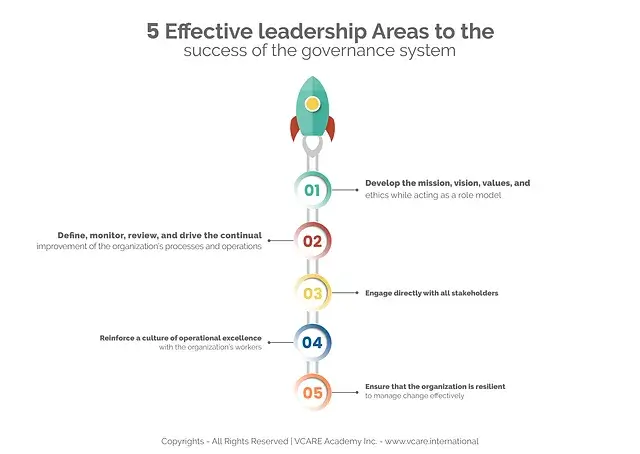In organizational sustainability, effective leadership is crucial to achieving success. In this article, we discuss 5 actions for leaders.
Effective leadership is critical to the success of the governance system and the organization's ability to achieve its goals. Leadership is defined as "a process by which an individual influences a group of individuals to achieve a common goal. Defining leadership as a process means that it is not a trait or characteristic of the leader. It is like a transactional event that takes place between the leader and the employees. Process implies that a leader influences followers and is influenced by followers. It emphasizes that leadership is not a linear one-way event, but rather an interaction event. When leadership is defined in this way, it becomes available to all. It is not limited to the formally designated leader in a group!
Leadership in organizational sustainability
Leadership is similar to management in many ways. Like management, it involves influence, as well as being work with people. Whatever managers do. Leadership, like management, is concerned with achieving goals effectively. It is concerned with achieving the goals of the organization, just as a manager would.
But leadership is also different from management. The characteristics of a leader can be traced back to the time of Aristotle. Management emerged at the turn of the 20th century with the rise of attention to our industrialized society. Management was created to reduce disorder in organizations to make them more effective and efficient. The primary functions of managers are to plan, organize, staff and control. This is true for most sustainability managers of organizations. The primary function of management is to provide order and consistency to organizations. Management is about seeking order and stability while leadership is about seeking adaptive and constructive change. To be effective, organizations must nurture both competent management and competent leadership. This is how we develop organizational sustainability.
Effective leadership
Effective leadership is critical to the success of the governance system and the organization's ability to achieve its goals. Leaders must take the following actions:

- Develop the mission, vision, values and ethics while serving as a role model
- Define, monitor, evaluate and drive continuous improvement of the organization's processes and activities
- Engage directly with all stakeholders
- Reinforce a culture of operational excellence among the organization's employees
- Ensure that the organization is resilient to manage change effectively.
The leader of the organization is committed to the organization's mandate and commitment. The purpose of the mandate is to ensure that the organization clearly understands the benefits of risk management and sustainability and will embrace the change involved by embedding these practices in the way the organization operates every day. It is imperative that the leader be closely involved in these programs to build credibility with external stakeholders.
Achieving the organization's goals is essential to the organization. Working in an uncertain world makes it more important that leadership is committed to risk management and organizational sustainability, and that these practices are explicitly recognized in everything the organization does.
Want to know more about organizational sustainability?
ATIM is a provider of VCARE Academy's training courses. Are you brushing up your knowledge with training?
VCARE is a renowned training institute that certifies supply chain professionals worldwide. VCARE's dedicated research and development team continually develops internationally recognized accredited certification programs. In doing so, VCARE collaborates with many international affiliates around the world to provide internationally accepted professional qualifications. With a certificate from VCare, you demonstrate that you are an industry expert.
Certified Production and Inventory Analyst
Having control over a broad spectrum of manufacturing activities that occur within a typical manufacturing or process industry can be viewed as a competitive edge in today's fast-paced economy. The CPIA course aims to enhance a student's understanding of the business environment, focusing on the role of manufacturing in particular.
Certified Store and Stock Controller
Good inventory and warehouse management can give you a big advantage. For example, when competing in the current environment of the customer saying, "I want it now." The CSSC program is designed to increase your knowledge in the following areas:
- The role of the store;
- Store staff functions;
- Managing inventory;
- Moving stock in and out of the store.
Certified Supply Chain Leader
The Certified Supply Chain Leader (CSCL) program is an advanced training course created for professionals looking to enhance their skills in supply chain management. This program offers participants practical and operational knowledge necessary for efficiently managing and leading supply chain operations.
Based on a hands-on, real-world approach, the CSCL program teaches the fundamentals as well as the intricacies of supply chain management. It is designed to provide participants with a comprehensive grasp of different facets of the supply chain, such as inventory management, procurement, production, storage, transportation, and the most recent developments and technologies in the industry.
VCARE Academy
This article on organizational sustainability was written by Dr. Bob Pojasek, from VCARE Academy.
Who is Bob?
Chairman Education and Research Executive Board (EREB).
VCARE Academy Inc. managing director
Sustainability Legend | ESG Reporting & Disclosures | Uncertainty Risk | Pollution Prevention Expert
Process Improvement | Organizational Sustainability Reporting | Sustainable Procurement Professor


Leave a Reply